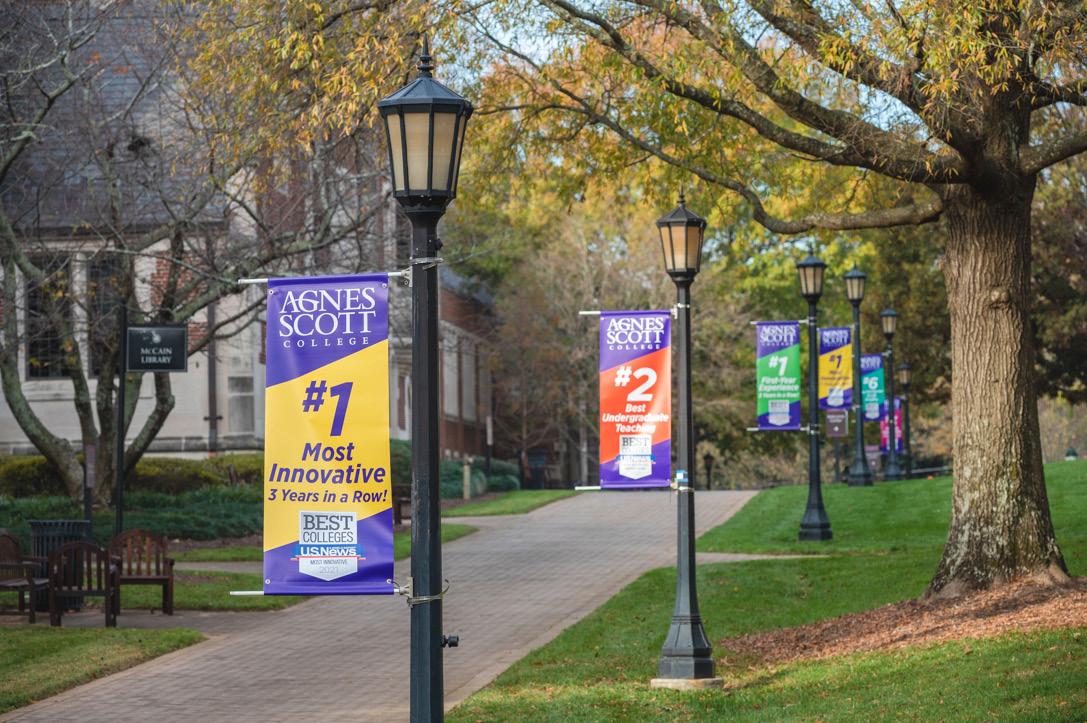Standing at the Vanguard: Agnes Scott on the Leading Edge of Tackling Racial and Social Injustice —By Jennifer Jiles
I
n late spring, as the world grappled with the intensifying COVID-19 pandemic, the ongoing issue of systemic racism, referred to by many as the second virus impacting the U.S., came to the forefront. The deaths of Ahmaud Arbery, Breonna Taylor and George Floyd ignited global Black Lives Matter protests, reinvigorating the focus on racebased social justice. College students across the country became a part of the movement. While some higher education institutions may have wondered how to develop a coordinated effort to respond to this urgent drive for change with sensitivity and leadership, Agnes Scott College already knew the way forward. Even before these important events unfolded, Agnes Scott was immersed in social change. “The renewed focus on racial justice as a pressing social challenge highlighted the importance of this work for many, but it is not new for Agnes Scott College,” says YvesRose Porcena, vice president for equity and inclusion. “We have been addressing racial inequities for a long time.” Agnes Scott’s mission of “engaging in the intellectual and social challenges of our times” has long guided the college’s commitment to addressing issues of diversity, equity and inclusion and to shaping socially conscious leaders. More than a mission statement, the college’s approach to liberal arts
14
education has always been solidly grounded in a commitment to the principles of social justice. The centerpiece of this commitment is the Gay Johnson McDougall Center for Global Diversity and Inclusion, which creates and hosts programs and events focused on inclusive excellence at Agnes Scott. These programs and events have brought significant recognition to the college, and Agnes Scott’s reputation for advancing equality and justice led the Association of American Colleges & Universities to select it as one of only 24 colleges in the nation to host a Truth, Racial Healing and Transformation campus center. As the pandemic lay bare the racial, social and economic inequities affecting communities throughout the U.S., the college
events: the COVID-19 podcasts highlighting the social inequalities of the global pandemic and the Truth, Racial Healing and Transformation Courageous Conversations on racism and hate. Porcena created the platform for the Agnes Scott community to learn from each other and advance the movement after seeing the significant work in which many people were already involved. “I wanted to provide a model and highlight the work of those who have been doing racial justice work way before it was trending,” she says. Janelle S. Peifer, assistant professor of psychology, participated in the “COVID-19 Social Inequities Impact on Mental Health” panel and spoke on the deepening and perpetuating inequities in the U.S. In
“As the most innovative institution for three years in a row, Agnes Scott must stand at the vanguard of envisioning the world ahead. We truly believe that education can catalyze important change and help correct historic ills for the betterment and flourishing of all people.” — Janelle S. Peifer, Assistant Professor of Psychology
quickly put systems in place for critical support and discussions. And when cries for racial justice seared the consciousness of many Americans following the death of George Floyd on Memorial Day, the center worked with members of the campus community to create two series in the wake of these national
addition to the meaningful dialogue on the topic, Peifer says the panel served as an opportunity to offer attendees some concrete steps for radical self-care amid the ongoing trauma of the pandemic and how to filter and moderate media consumption. She applauds the center for its “active, engaged,









